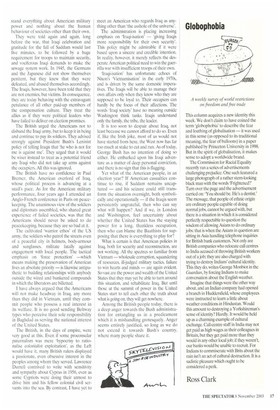Globophobia
A weekly survey of world restrictions on freedom and free trade This column acquires a new identity this week. We don't claim to have coined the term `globophobia' to describe the fear and loathing of globalisation — it was used in this sense (as opposed to its traditional meaning, the fear of balloons) in a paper published by Princeton University in 1998. But in the spirit of globalisation, it makes sense to adopt a worldwide brand.
The Commission for Racial Equality recently ran a series of advertisements challenging prejudice. One such featured a large photograph of a rather stern-looking black man with the words 'Frightened?' Turn over the page and the advertisement carried on; 'You should be. He's a dentist.' The message, that people of ethnic origin are ordinary people capable of doing normal jobs, cannot be argued with, but there is a situation in which it is considered perfectly respectable to question the wisdom of allowing Asians to do ordinary jobs: that is when the Asians in question are sitting in Asia handling telephone inquiries for British bank customers. Not only are British companies who relocate call centres to India accused of throwing British workers out of a job; they are also charged with trying to destroy Indians' cultural identity. This they do, writes George Monbiot in the Guardian, by forcing Indians to make conversation about the English weather.
Imagine that things were the other way about, and an Indian company had opened a branch in Huddersfield, whose employees were instructed to learn a little about weather conditions in Hindustan. Would this amount to destroying a Yorkshireman's sense of identity? Hardly. It would be held up as a charming example of cultural exchange. Call-centre staff in India may not get paid as high wages as their colleagues in Britain, but they get paid more than they would in any other local job; if they weren't, our banks would be unable to recruit. For Indians to commiserate with Brits about the rain isn't an act of cultural destruction. It is a sadistic pleasure which ought to be considered a perk.
Ross Clark


































































































 Previous page
Previous page